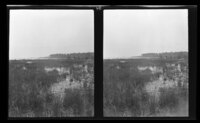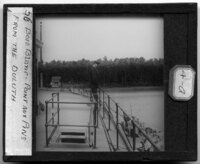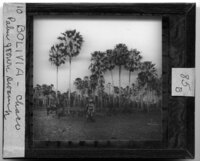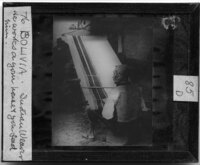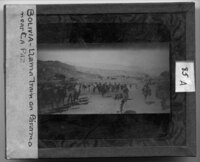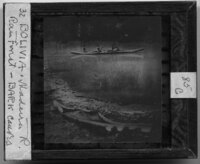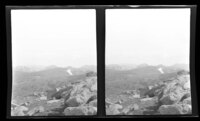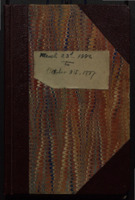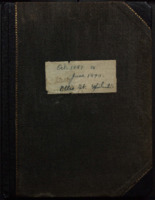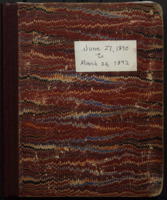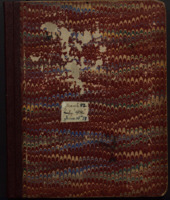Search
6346 items
-
Photograph of a bog. Tall grasses grow sporadically in the water. A person walking in the midground. Stands of trees can be seen in the background. Jefferson would often use the same negative to create a lantern slide as well as a mounted stereographic card. When possible we have indicated if it is a repeat image, however this is not always the case. As such, there may be a corresponding digitized glass lantern slide, and a mounted stereographic card associated with this stereographic negative within the Mark Jefferson Collection.
-
Shoreline of Lake Huron near Bois Blanc Island, Michigan, taken from the deck of the Duluth. The captain of the boat is standing on the deck looking out over the lake and the pier next to the boat. People can be seen on the pier either waiting to board the boat or are walking back to shore. The shoreline is sandy with dense trees and other foliage.
-
Image from a published source. A man and his horse are pictured standing near a grove of palm trees growing in a swamp in Bolivia. The landscape is bare except for the palm trees. Slide labeled with text, "Made by G.R. Swain, 713 E. University Ave., Ann Arbor, Michigan." Swain was staff photographer at U of M from 1913 to 1947.
-
Image from a published source. An Indian weaver is sitting on a rock making a rug or poncho in Bolivia. The weaver is using a type of loom called a backstrap loom, where the warps are stretched between two pieces of wood. He is using a shuttles to weave material through the warps. Slide labeled with text, "Made by G.R. Swain, 713 E. University Ave., Ann Arbor, Michigan." Swain was staff photographer at U of M from 1913 to 1947.
-
Image from a published source. A llama train on Paranco near La Paz, Bolivia. Native farmers can be seen walking with two donkeys away from the llamas and the landscape in the background is mountainous and rugged. Small houses are grouped in the background and make up a small community. Slide labeled with text, "Made by G.R. Swain, 713 E. University Ave., Ann Arbor, Michigan." Swain was staff photographer at U of M from 1913 to 1947.
-
Image from a published source. A bark canoe being made on the bank of the Madeira river in Bolivia. Three men can be seen rowing a bark boat on the river to show how the boat works. It is noted the Madeira river runs through the rainforest of Bolivia. Slide labeled with text, "Made by G.R. Swain, 713 E. University Ave., Ann Arbor, Michigan." Swain was staff photographer at U of M from 1913 to 1947.
-
Photograph of a large boulders taken in Colorado. The rocks are light in color and show signs of weathering and erosion. Sparse vegetation can be seen in the midground. Large mountains rise in the background. Jefferson would often use the same negative to create a lantern slide as well as a mounted stereographic card. When possible we have indicated if it is a repeat image, however this is not always the case. As such, there may be a corresponding digitized glass lantern slide, and a mounted stereographic card associated with this stereographic negative within the Mark Jefferson Collection.
-
On January 17, 2022, Jones sat down with Citizens for Community member and activist, Bonnie Dawn Clark. Before she moved to Ypsilanti in the mid-1990s, Bonnie was living in the South, always close to where she had been born and raised in North Carolina. With a passion for social justice and activism, she took part in movements advocating for equality for women and LGBTQ people, and even participated in environmental protests. It was only natural for her to become involved with Citizens for Community once the group heard about the incident with EMU group, Tri-Pride. As the city council took on the complaint and pushed it to the Human Relations Commissions hearings, she realized she could use her religious upbringing and knowledge of the Bible to dispel some of the opposing arguments. After the campaign ended, she returned to North Carolina where she has since started a non-profit organization for homeless LGBTQ youth. During this interview, she shares her experiences with being LGBTQ and a woman in the military, and reflects on the importance of an ordinance like 1279.
-
The diary of Jennie Pease D’Ooge dated from March 1886 to October 1887 begins on D'Ooge's 29th birthday, eight months after her marriage to Benjamin L. D'Ooge. It documents Jennie's pregnancy with her first child, Ida Joanna D'Ooge, birth in February 1887, and early months of motherhood; Benjamin's appointment to the chair of Greek and Latin at the Michigan State Normal School in Ypsilanti, following the resignation of Joseph P. Vroman; the couple's summer visit to Grand Rapids and Macatawa Park; and their move from Ann Arbor to Ypsilanti. Jennie and Benjamin rent a house in Ypsilanti, attend the First Congregational Church of Ypsilanti, and get involved with the local community, while maintaining ties with Ann Arbor and University of Michigan society. Jennie chronicles her daily household, social, and recreation activities; her involvement with the University Musical Society Choral Union, Congregational and Presbyterian churches, a missionary society, and other local organizations; and the lives of a wide circle of family and friends. She reads extensively; studies German, French, and Latin; takes sketching and watercolor lessons; plays tennis; and regularly attends lectures and theatrical and musical performances. She also comments on world events, including labor strikes, debates over Irish home rule, and the construction of the Panama Canal. The telegraph, the telephone, steamships, and the railroad enable members of the Pease and D'Ooge families to communicate and to travel across Michigan and the United States and overseas. For more local travel, Jennie and Benjamin walk on foot, take streetcars and interurbans, and ride in horse-drawn phaetons, barouches, and other carriages, either rented from a livery or borrowed from a friend. The diary includes drawings, newspaper clippings, and other ephemera.
-
The diary of Jennie Pease D’Ooge dated from October 1887 to June 1890 chronicles the D'Ooge family's increasingly busy homelife, social engagements, and activities in the community, as well as the career of Jennie's husband, Benjamin L. D'Ooge, a professor of Greek and Latin at Michigan State Normal School in Ypsilanti. In July 1888, they move from Ellis Street to a rented house at 423 Ballard Street. The couple's first daughter, Ida Joanna, is joined by a second, Helen Irene, in May 1889. The diary records the children's milestones and daily occurrences, especially the phrases and mannerisms of little Ida that Jennie finds funny. Ida's "baby talk" provides a glimpse of the D'Ooges' parenting styles and values. Jennie regularly suffers from "bilious headaches," has a number of dental visits, and experiences pain after weaning Ida and again when beginning to breastfeed Helen, the children are occasionally afflicted with stomachaches or sore throats, and "La Grippe" briefly sweeps through the family during the 1889-1890 influenza pandemic, but overall the family is in good health. Ben publishes Colloquia Latina in 1888. He and Jennie appear to be gaining financial stability. They purchase real estate in Detroit and Grand Rapids, in addition to investments in Minneapolis and Sault Ste. Marie, and in June 1890 buy land on Normal Street on Ypsilanti, where they hope one day to build a home. Jennie sews some clothing for herself and her daughters, but more often she hires a seamstress or orders custom garments from a dressmaker in Pennsylvania. Jennie is again assisted by a live-in nurse during and after childbirth. The family employs a series of young women, including Phebe Crownover from the Industrial Home for Girls in Adrian, to help with housework and childcare. They adopt a kitten, followed by a puppy, whom they name Rab. Outside of the house, the D'Ooges are heavily involved with the First Congregational Church of Ypsilanti. Jennie is elected secretary and treasurer of the Ladies' Aid Society and president of the Young Woman's Missionary Society, teaches the Sunday School infant class, and participates in the Young People's Society of Christian Endeavor (YPSCE), Home Missionary Society, and Young Women's Christian Association (YWCA). Ben steps down from his role as president of the Young People's Missionary Society (YPMS) but continues as deacon and becomes superintendent of the Sunday School. Both are also active in academic and arts organizations in Ypsilanti and Ann Arbor. She is a member of the Sappho Club, a music appreciation and performance group, and the Ladies' Literary Club in Ypsilanti, and he participates in University of Michigan alumni events and goes to Schoolmaster's Club in Ann Arbor. Jennie and Ben spend time with their siblings, parents, and extended family in Ann Arbor and Grand Rapids. They visit Detroit to shop or conduct business. Their summers are spent at a shared cottage in Charlevoix, where they boat, fish, and relax outdoors. In August 1889, a sailboat capsizes in Lake Michigan with Ben and his niece, Jennie Utterwick, aboard. They are rescued, but it is a frightening experience. Jen Utterwick dies of tuberculosis in December.
-
"In her diary spanning June 1890 to March 1892, Jennie Pease D'Ooge documents her daily activities and thoughts, family and community news, and memorable moments with her young children. She has pasted numerous clippings from newspapers and periodicals into the front and back of this volume, including poetry and articles on diverse topics (e.g. parenthood, the population of Michigan towns and cities, Richard Wagner, how men and women try on shoes differently), some serious and others humorous. Throughout the book, she encloses newspaper articles pertaining to her family or topics of interest to her, as well as fabric swatches and other ephemera. Jennie and her husband Benjamin L. D'Ooge continue to be busy raising their children, improving their rented house on Ballard Street, and maintaining a large familial and social network. They travel via ship on the Great Lakes to their cottage in Charlevoix each summer, along with many other Michigan State Normal School faculty families. After learning she is pregnant for a third time, Jennie worries about managing her household and parenting responsibilities. Her elder sister, Ida Pease, is an invaluable source of support for her. A son, Leonard, is born in April 1891, joining daughters Ida and Helen. His eczema concerns Jennie, as do the children's occasional illnesses, which she treats with homeopathic remedies. The 1890-1891 influenza pandemic, ""La Grippe,"" surges in spring 1891 and again in winter 1891-1892. Jennie remains active in numerous religious and secular organizations, including the Ladies' Aid Society, Young Woman's Missionary Society, Young People's Society of Christian Endeavor, and Sappho Club, but resigns some of her leadership positions. Her husband, Benjamin L. D'Ooge, steps down from his role as superintendent of Sunday School and begins teaching a class in Italic dialects at the University of Michigan. The D'Ooges' domestic servant from the Industrial School for Girls in Adrian, Phebe Crownover, returns home, and her place is taken by Emma Johnson, who is replaced shortly thereafter by Lillie Nicholson in November 1890. The advent of the Ann Arbor-Ypsilanti Street Railway in January 1891 makes intercity travel faster, easier, and more affordable. Jennie enjoys a stroll in the sunshine with her children or an evening walk on her own, but she also uses the ""motor"" for travel within Ypsilanti, especially when it is muddy or she is tired. Jennie's sister and their father, Galusha Jackson Pease, live in Ann Arbor, and the two households have regular contact. Ben's brother, Martin L. D'Ooge, a professor at the University of Michigan, and their mother and siblings from Grand Rapids and elsewhere make frequent appearances in the diary. Jennie and Ben correspond by mail and telegram with more distant relatives. Jennie's maternal grandfather, Obil Deuel, dies in southern California in September 1891, leaving much of his $7500 estate to his four grandchildren."
-
"Jennie Pease D’Ooge’s March 1892 to June 1893 diary chronicles her daily life in Ypsilanti, Michigan, local visits to Ann Arbor and Detroit, and summers in Charlevoix. She and her husband, Benjamin L. D'Ooge, co-parent their three children, with support from a hired domestic servant, Jennie’s sister and father in Ann Arbor, and neighbors. Their daughters Ida and Helen attend kindergarten and have playdates with neighborhood friends, and their son Leonard learns to walk and talk. Jennie notes that it is challenging to keep more than a basic record of events and activities in her diary, because the children demand so much of her time and attention. This fourth volume is the first in which Jennie does not give birth to a child. Hashes appear to mark when Jennie is “sick,” i.e. having a menstrual period. In late October 1892, following about two months of feeling tired and unwell, she is “taken sick” and must call for the doctor. Beyond this acute episode, Jennie regularly reports fatigue, backaches, and “bilious” headaches, perhaps migraines, among other ailments. She treats herself and her children with homeopathic remedies, and her knowledge is such that a friend nicknames her “Dr. D’Ooge” and comes to her when the doctor is unavailable. While Jennie tries to minimize her church and club responsibilities and delegate work to others, she remains active in numerous organizations. Her activities include: fundraising for the First Congregational Church’s new parsonage, teaching the Sunday School infant class, attending and presenting on musical topics at Sappho Club meetings, and giving papers to the Young Woman’s Missionary Society. Jennie finds little time to read during this time period, but she frequently attends academic lectures, musical and theatrical performances, teas, picnics, and dinner parties. She and Ben become close friends with the new pastor of their church and his wife, Bastian and Helen Smits, and spend many evenings playing Logomachy, a word game created in the 1880s. The two couples consider purchasing a yacht together in Charlevoix. Diary entries and accounting ledgers in the back of the book reveal much about Jennie’s personal finances, her attitudes toward women’s economic autonomy, and how she and her husband view their respective roles within the household. Ben pays Jennie an allowance, which she feels she “at least” earns through her household work. Additionally, she maintains her own investments, collects interest on cash she has loaned her husband and others, and receives more than $1500 from her maternal grandfather’s estate. Following disagreements with Jennie and Ben over her behavior, Lillie Nicholson, the D’Ooges’ domestic servant from the Industrial School for Girls in Adrian, quits. For the time Jennie is without a “girl,” Ben pays her $2.50 a week to either hire someone to do household chores or to do them herself. Jennie records these payments and expenses carefully in her diary. The additional work is taxing on her body and she is relieved to welcome back a previous servant girl, Flora Cattermole. The D’Ooges are having the kitchen and bathroom of their rented house at 423 Ballard Street plumbed for hot water, which Jennie anticipates will save steps and labor. Friends returning from Europe give Jennie accounts of being quarantined due to the 1892 cholera outbreak in Hamburg. She remarks upon the historic second inauguration of President Grover Cleveland in March 1893. On April 12, 1893, Ypsilanti is struck by a cyclone. The D’Ooges’ neighborhood is spared, but for months the “cyclone district” remains a point of interest for visitors. The World’s Columbian Exposition, or World’s Fair, opens in Chicago on May 1, 1893, and Jennie and Ben, along with many in their circle, make plans to attend during the summer."

